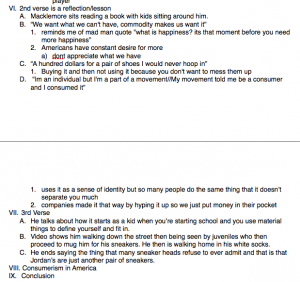Ted Talk Outline
Intro: I want to begin by asking you all to think back to when you were a kid and there was that one kid in your class that you just could not stand. *picture of kid watching other kids play* I remember there was a new kid in my class named Jason that everyone instantly loved and took all the attention from me which made me upset as it would any 6 year old who loves attention. I decided to make up a rumor that he farts a lot. *picture of kids making fun of kid* Yeah I was quite the creative genius but soon enough it spread and no one wanted to be friends with him. Looking back I can tell how terrible this is and I would never do something like this again. Now I tell this story because something similar happened here in the united states but on a much bigger scale.
Part 1 : Historical reasons to why it became illegal
Mexican immigrants came over and brought with them the cultural activity of recreational marijuana use. *old picture of mexican smoking* As unemployment raised through great depression people blamed the Mexicans. The government decided to criminalize the activity on basis that it insights crime.
Part 2: Government stance as new science comes out
Began in the 30s
- Reefer Madness propaganda film released *reefer madness poster*
- MPAA banned showing of drugs in films
- Marijuana Tax Act Passed *picture of act*
- –> La Guardia Report Released *picture of La Guardia report*
Widespread use by white upper class in 60s *picture of hippies and woodstock*
- –> Reports by Johnson and Kennedy disprove theories
In 1970 Controlled Substances Act makes it schedule 1 *picture of nixon signing*
–> Shafer commission suggests it should be decriminalized *picture of news headline (http://i.imgur.com/tzKFkQb.png)*
- States begin independently loosening penalties
Anti drug abuse act and comprehensive crime control act of 1984 intensify *Reagan signing*
–> Cali decides to legalize use of medicinal *picture of dispensary*
Due to a 2005 SC case, government is allowed to crack down on weed even if its legal in the state which they do through 2011 *Gonzales v. Raich political cartoon*
–> 2012 Colorado goes green *welcome to colorado*
2013 DOJ announces it wont sue the states who legalize and won’t fight
Part 3: What is really happening: Pharmaceutical, Tobacco, and prison companies all lobby against it. *Pictures of logos of lobbying organizations*
- Where CADCA and Partnership for Drug-Free kids get their money (Pharmaceutical companies)
- Continued lobbying over the years.
“–>” indicates scientific/governmental progress in favor of reform
Sources referenced:
http://origins.osu.edu/article/illegalization-marijuana-brief-history
http://www.pbs.org/wgbh/pages/frontline/shows/dope/etc/cron.html
http://www.nytimes.com/interactive/2013/10/27/us/marijuana-legalization-timeline.html?_r=0#/#time283_8117
http://www.gallup.com/poll/186260/back-legal-marijuana.aspx
http://www.gallup.com/poll/163835/tried-marijuana-little-changed-80s.aspx
http://www.gallup.com/poll/186260/back-legal-marijuana.aspx
https://www.washingtonpost.com/news/wonk/wp/2016/07/13/one-striking-chart-shows-why-pharma-companies-are-fighting-legal-marijuana/
https://www.thenation.com/article/anti-pot-lobbys-big-bankroll/

